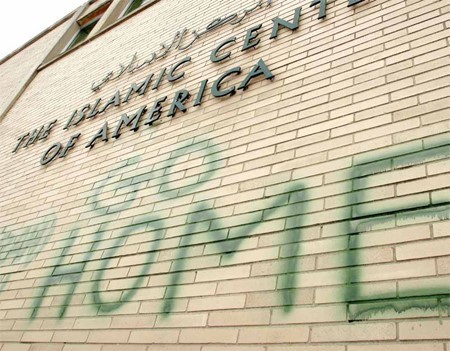Some people ask the question, is there really such a thing as "Islamophobia," or are Muslims merely indulging in a culture of victimhood? While most Muslims may feel that even to ask the question is an impertinence, there really are people out there asking it. So let's look at some facts.
Islamophobia, defined as an irrational fear of Muslims and Islam, does not arise out of a vacuum. Before, but particularly after 9/11 the media focus on terrorism by Muslims -- even though a recent New York Times article has shown that terror by right-wing extremists is a greater threat -- is a potent source of that fear. Contributing to and building on that media focus, a whole industry of anti-Muslim bigotry, detailed in the Center for American Progress report Fear, Inc., constantly works to fan the flames of bigotry and fear with ongoing campaigns and attacks on Muslims and Islam, painting all Muslims with a broad brush as real or at least potential threats to America's security and way of life. Islamophobia is the fruit of all this.
Polls from last summer leave no room for doubt that anti-Muslim bigotry and resultant Islamophobia are very much alive and have grown increasingly worse. According to polls by Zogby Associates, the percentage of Americans viewing Islam favorably dropped from 35 percent in 2010 to 27 percent in 2014. This goes along with findings that 42% approve of law enforcement profiling Muslims and Arabs (whom most Americans incorrectly assume are all Muslims), while only 34 percent are confident that an American Muslim could be trusted to work in an important government post. A Pew Research poll found that Americans view Muslims more "coldly" than any other religious group, including atheists.
Add to this in recent months the actions of and media infatuation with the group known as ISIS, which have reconfirmed and exceeded common stereotypes about Muslims. ISIS-inspired acts of violence in the West such as the Charlie Hebdo attacks, have led to an unprecedented spike in anti-Muslim sentiment and hate crimes. Attacks and vandalism against nationwide mosques, the horrific murder of three Muslim students in Chapel Hill, NC, the confrontation of mosque attendees in Phoenix, AZ by several hundred armed protesters, and this week's vandalism against a Muslim family's house in Iowa are among the growing number of acts of hate in recent months which clearly demonstrate the impact of constant exposure to the vilification and demonization of Muslims. Fourteen years after the September 11th tragedy, hate crimes against Muslims continue at a rate five times higher than before that event; they account for 13 percent of all religiously motivated hate crimes, second only to those committed against Jews. Such crimes affect more than their immediate victims, leaving all Muslims with feelings of fear and insecurity as one can never know when bigotry will turn violent.
So there can be no question that Islamophobia is real. The question is what are we going to do about it, not only for the sake of Muslims but for all Americans, who live peaceably together in their diversity thanks to America's long, constitutionally guaranteed tradition of religious pluralism and acceptance. As we move through Ramadan, subsequent articles will explore further impacts of this problem on children, public safety and the delivery of services, and ING's unique response to this growing challenge.
Maha Elgenaidi is the CEO of Islamic Networks Group (ING), a non-profit organization that counters prejudice and discrimination against American Muslims by teaching about their traditions and contributions in the context of America's history and cultural diversity, while building relations between American Muslims and other groups. To find out more about ING, visit http://www.ing.org.
Maha is the author of training handbooks on outreach for American Muslims as well as training seminars for public institutions on developing cultural competency with the American Muslim community. She holds a master's degree in Religious Studies from Stanford University and received her bachelor's degree in Political Science and Economics from the American University in Cairo.

